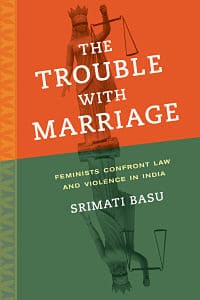Politics, law and global agendas all actively shape the kinship bonds that are formed and sometimes dissolved in marriage. To study marriage― what it is across cultures, how it is lived and how it is brought to an end― is to learn about how gender, race, law, religion, ideology and the state together shape the everyday lives of persons.
Marriage draws the interest of social scientists, according to Hirsch and Wardlow, because it “sits at the nexus of large-scale social processes and intimate life” (2009, 2).
 Defining, monitoring, and sanctioning of appropriate conduct in marriage, states turn the intimate relationships they endorse into matters within the purview of their governance. Srimati Basu (2015) presents a volume that takes the study of the state’s role in the governance of intimacy a step further. The author proposes to put “marriage itself on trial, allowing us to examine it as a site of privilege, entitlement, and exclusion on the one hand, and of deprivation, vulnerability and violence on the other” (Basu 2015: 14).
Defining, monitoring, and sanctioning of appropriate conduct in marriage, states turn the intimate relationships they endorse into matters within the purview of their governance. Srimati Basu (2015) presents a volume that takes the study of the state’s role in the governance of intimacy a step further. The author proposes to put “marriage itself on trial, allowing us to examine it as a site of privilege, entitlement, and exclusion on the one hand, and of deprivation, vulnerability and violence on the other” (Basu 2015: 14).
Basu’s analysis is based on observation of formal and alternative marriage dispute processes in courtrooms, side-bar in-camera negotiations, alternative dispute resolution sessions as well as interviews with judges and dispute resolution counselors. Focusing on the development and practice of alternative marital dispute resolution systems in India, Basu’s extensive ethnographic account documents how feminist agendas become complicit in buttressing the very systems of male privilege that they seek to challenge.
In India, as elsewhere, alternative legal systems are not simply used as they are prescribed or intended. For Basu it is in fact the “off-label” uses of the law or practices of “forum-shopping” that are most illustrative of how legal pluralisms are designed to mitigate inequity do enable the entrenchment of the same prevailing ideologies supported in formal laws. Agency and knowledge of the concrete application of legal alternatives is showcased as individuals and families negotiate the venues to seek redress for troubles in marriage and decide when to bypass the state by bargaining outside the law. Basu centers her work on alternative dispute resolution (ADR) systems that by design privilege community norms over those that are state-sanctioned in formal law.
The Trouble with Marriage tangibly complicates the work of women’s rights advocacy.

For instance, the establishment of Women’s Police Stations, favored in international feminist advocacy as a best practice for mitigating violence against women is challenged by Basu’s findings that demonstrate how the Women’s Grievance Cell of Kolkata actively directs women into negotiated settlements and away from the criminal prosecution of violence. Similarly, she shows that the emergence of ADR system’s in India are partially a result of the successes of the women’s rights movement that sought to reduce the incidence and social supports of violence against women. The establishment of ADRs is based on the notion that setting legal norms will ultimately enable the transformation of social norms.
In my own work on marital rape in global contexts, the criminalization of rape in marriage has similarly been embraced as a way to alter the cultural fabric. The problem on the ground is that cultural change via aspirational law ignores the ways that gender norms and aspirations, folk-definitions of marriage and other expressions of gender-inequity actively disable the law as a tool for social change (Yllö and Torres 2016). This is borne out in the breadth of Basu ethnographic detail.
Basu demonstrates how the application of feminist legal agendas in particular global contexts, such as ASDs in Kolkata is in Spivak’s terms both “poison and medicine” and further entrenches gender inequity in unintended ways.
Take, for instance, the ways that feminist principle of consent and compensation have been used to reform Indian rape law. Such re-workings in the Indian context, as elsewhere, inadvertently situate marriage as the opposite or even the solution to rape (Menjivar 2011). Juxtaposing two well publicized cases of rape in conjunction with trial and in camera testimonies from more typical cases, Basu chapter on the unintended consequences of rape law reform argues that rape in India is used to resolve material and cultural needs and cannot be studied outside the context of exchange in which marriage is situated. Showcasing files where litigants contend that pre-marital sex be deemed a crime lest it is converted to marriage, Basu demonstrates the ways that this particular cultural context subverts the feminist principles behind the legal reforms.
This happens in similar ways when domestic violence complaints are steered away from criminal law venues into civil complaints resolvable through monetary compensation or alternative dispute resolution. Basu deconstructs the de-criminalization of domestic violence by tracing the cultural life of the Indian Penal Code section in which it is addressed.

Despite the ways that the practice of both formal and alternative laws constrain women in Basu’s ethnography, her narrative makes it clear that Indian women do exert a significant level of agency legal negotiations. The extent of their agency, however, is constrained by prevailing gender conceptions and the ideologies inherent in the text and practice of the law and its alternates. All too often in Basus’s text women exert agency by adhering to notions that they are viable as economic persons only within the context of marriages and further that they must avail themselves of protection by their state, their families and even their offending husbands.
This is an important point though not particularly new insight: prevailing gender ideologies shape juridical encounters.
However, Basu’s work does not just show the workings of gender norms in different forms of legal negotiation but also questions the efficacy of legal reforms and the intent to better the lives of women through them. Doing so, she encourages the readers to seriously question whether legal reform is the best tool to advance women’s rights in global context.
References:
Hirsch, Jennifer S., and Holly Wardlow, eds. Modern Loves: The Anthropology of Romantic Courtship and Companionate Marriage. Ann Arbor: University of Michigan Press, 2009.
Menjívar, Cecilia. Enduring Violence: Ladina Women’s Lives in Eastern Guatemala. Berkeley: University of California Press: 2011.
Yllö, Kersti and M. Gabriela Torres, eds. Marital Rape: Consent, Marriage and Social Change in Global Context. New York: Oxford University Press, 2016.
Basu, Srimati. 2015. The Trouble with Marriage: Feminist Confront Law and Violence in India. Oakland: University of California Press. 280 pp. Pb.: $29.95. ISBN: 978-0-5202-8245-2.
**********
Featured image (cropped) by Adam Jones (flickr, CC BY-SA 2.0)


